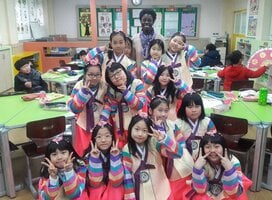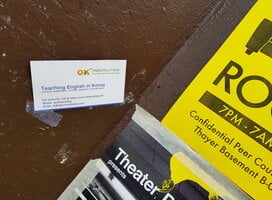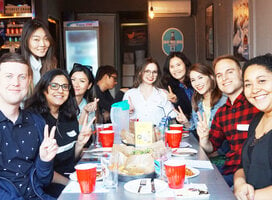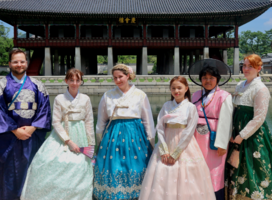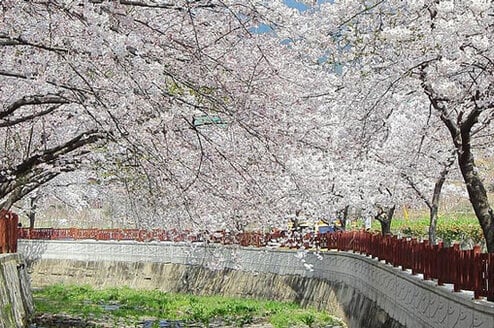Teach English in Seoul, South Korea
Do you own a Samsung flat-screen, or drive a Hyundai? Have you ever tantalized your taste buds with the scorching bold flavors of kimchi? Have you stumbled upon Psy’s catchy, quirky dance moves against the backdrop of a massive energetic city? If so, then you have certainly been exposed to the many innovations of Korean culture, technology, and entertainment.
As a whole, Korea is a country that has truly risen from the ashes of a war that literally split the country in half to this very day. Its hyperkinetic capital city of Seoul is on the forefront of this development and change; with the world’s fastest Internet connection, world’s best subway system, and rapid urban growth, Seoul is truly the “Miracle on the Han River,” and the rest of the world has taken notice.
Throughout Seoul, and the whole country, the demand to learn English is very high; as a result, Seoul and all of South Korea has a well-established ESL market, with constant demand for native English teachers.
For many young English teachers, Seoul is a highly desirable place to live, work, and play. It is a world-class city, offering expats a window into Korean culture, while embracing international cultures. Native English teachers in Korea are usually offered lucrative salaries, with benefits that include free housing. After a day on the job, Seoul beckons with bright lights, enticing street food, excellent shopping, and exciting nightlife. Just like the Korean education system, getting a teaching job in Seoul can be extremely competitive. However, with patience and help from this guide to Korea’s sparkling capital city, you can begin your research and find an opportunity that truly has “Seoul!”
In order to teach English in Seoul, most teachers will require TEFL certification. The average salary for teaching in Seoul is $1,500 - $2,600 per month.
Public Schools/SMOE Programs:
The Korean Ministry of Education established various programs to promote English language learning in the Korean public schools. The Seoul Metropolitan Office of Education (SMOE) provides such opportunities for the Seoul metropolitan area. If you are a SMOE teacher, you will most likely be the only Western teacher in the school, but you will have a Korean co-teacher who is supposed to help with classroom management and lesson implementation.
Some English teachers in Korea prefer the public school jobs because they are stable, they receive a decent salary between $1750 USD and $2363 USD, and they are guaranteed placement somewhere in a Seoul public school. Hours are usually 8:30 am to 5:00 pm, Monday through Friday. These are yearlong contracts with start dates that coincide with the beginning of school semesters, end of February and end of August. Benefits include reimbursed airfare, free accommodation, and 18 days paid vacation. SMOE prefers the teachers to have at least a 100-hour TEFL certification, 1 year of full time teaching experience, teaching credentials, or a Master’s degree. Two similar programs are EPIK (for all over Korea) and GEPIK (for the Gyeonggi Province).
Note: Sometimes there are more teachers applying for jobs than there are actual jobs, and because Seoul is such a popular request for English teachers, those jobs get snapped up quickly! Make sure you do your research, get all of your visa documents together in a timely fashion, and decide if teaching in Seoul is right for you. Then, go for it!
Private Language Academies/Schools:
Private language schools, or hagwons, are basically schools children and teenagers attend after their regular school day to receive extra instruction in English or other specific subject areas. In contrast to public schools, hagwons hire year-round, with working hours usually starting in the afternoons around 1 or 2 pm and ending around 9 pm. Vacation time is not usually as plentiful and sometimes the pay can be lower or higher than at the public schools. However, you will encounter more native English teachers working in your hagwon, and the class sizes are smaller than at the public schools.
International Schools:
To provide quality international education for the children of expats, Seoul does have a number of international schools, such as Seoul International School and Yongsan International School of Seoul. They do offer English language instruction for their students, as well as all other subjects. The international schools require their teachers to have the proper credentials from their home country, and the pay and hours are similar to what would be expected in a regular school back home. Sometimes the school website advertises openings; other times there are job fairs sponsored by organizations such as International School Services and Network of International Christian Schools.
Adult Schools:
Korean adults need to learn English for work, travel, or for their own enjoyment. Adult hagwons do not always provide housing for their teachers; sometimes they provide housing allowances. They also have split shift schedules, meaning a teacher will work with students for several hours in the morning, have at least a 5 hour break in the middle of the day, and return to teach in the evening. Split shifts are meant to accommodate an adult student’s schedule and availability.
Universities:
Teaching English in a university is a very coveted position, and Seoul is home to several world-class universities, such as Seoul National University and Yonsei University. While the salary may be lower compared to hagwons and public schools, university teachers get more vacation time, and may even be able to teach subjects other than English. Universities prefer Masters’ degree holders, and tend to hire teachers who are already in Korea.
Note: The conditions of the E-2 working visa that allows you to teach English in Korea do not permit you to take on private students. It is illegal and can result in deportation. Some teachers are able to take the risk and make it work, but better safe than sorry!
When and Where to Look for Jobs:
Hagwons tend to hire year-round, while public school programs like SMOE start hiring processes at least four months before a new semester begins, which would be the end of February and the end of August.
Contracts are a year-long in either position, with SMOE positions on a first-come, first-served basis. Fortunately for new and experienced teachers, finding jobs in Seoul is very easy. Most teachers, especially the first-timers, choose to go through a recruiter, and there are plenty willing to help out.
While teaching in Seoul may be an exciting adventure, make sure you do your research on recruiting companies and schools. Watch out for schemes that ask you to pay money for the services, and be wary of schools that refuse to give you contact information of current or previous English teachers. As always, once you get an offer, make sure it’s what you want, and make sure you understand the contract before you sign it.
Qualifications:
As a requirement for the E-2 Visa, English teachers going to Seoul must have a bachelor’s degree from an accredited university. Koreans prefer North American accents, but anyone from any of the native English-speaking countries can find good positions.
Since Seoul is so popular with teachers, schools and recruiters find themselves inundated with applications, and competition can be fierce. Recently SMOE and EPIK have requested candidates to possess teaching credentials from their home countries, or a Master’s degree. Some schools prefer their teachers to have had at least 100 hours of TEFL certification, especially with a classroom component.
Salary & Cost of Living:
Salary: Most English teachers in Seoul can make anywhere from $1500 to over $2000 USD per month. In addition to a fairly decent salary, another reason that makes teaching in Korea so attractive, and Seoul, is that employers offer rent-free housing for their teachers. Teachers are responsible for paying utilities (electricity, Internet, water, etc.) and a monthly building maintenance fee, which can total anywhere from $105 USD to about $150 USD. If you’re not paying rent, that leaves a nice chunk of change to be used towards enjoying that wonderful Korean food, entertainment, sending money home to pay off loans or to just set aside, or to travel.
Housing: If your school does not offer you rent-free housing, they will likely give you a monthly housing allowance, which is usually around $262 USD, and you can find your own housing. Keep in mind that Seoul has a very dense population, so apartments here tend to run smaller than you would expect. The neighborhood of Itaewon is a popular choice because of its close proximity to the U.S. Army base, good transportation, and plenty of restaurants and shops that cater to the foreign population.
Food: Seoul has plentiful options when it comes to food, and it is possible to eat cheap or expensive, depending on your lifestyle. A meal in a Korean restaurant can cost anywhere between $0.88 USD to $13 USD, so it is very inexpensive and delicious. Of course, a meal in a Western restaurant is more expensive.
Classroom & Work Culture:
- Work Culture: When it comes to dress code at work, it is best to take your cues from your co-workers. You can never go wrong with business casual, especially if you’re teaching adults. Pay attention to your co-workers and when in doubt, ask. While not a requirement, it is nice to have a small gift for your boss when you arrive in Korea, something that may be unique to your home country. Be prepared to be invited to after-work dinners and drinks with your co-workers and bosses; it’s okay to say you can’t attend, but don’t refuse all the time. Koreans are very friendly people, but they try to avoid direct conflict, based on the notion of saving face.
- Student-Teacher Relations: Students are also taught from a young age to show respect to adults and teachers, and to save face if they do not understand something. Most of the time, the students will complain to their parents, who will then call the school with their complaints. In addition, Korean students are under a great deal of stress from a young age. They already deal with high-stakes testing, and there is fierce competition to get the best grades to enter the best high schools and universities. These kids probably have a full day at their regular school and then go to at least two other hagwons before coming to yours. Their workload is huge, so it’s okay to be merciful if a kid doesn’t complete the homework assignment you give them every once in a while, as long as it doesn’t interfere with their progress.
Also remember, contracts in Korea are flexible, especially when the hagwon begins its Intensives schedule (extra hours and classes during students’ winter and summer breaks from their regular school). As in everything, ask questions, research thoroughly, and discover what’s right for you as you prepare to teach in the exciting city of Seoul.
What People Are Saying
New Teaching Jobs
View the latest teaching job postings on our job board.
Related Teach Abroad Articles
Frequently Asked Questions
-
How do I become an English teacher in South Korea?
To become an English Teacher in South Korea you need to be a native English speaker from an approved country (for the E-2 visa), have a bachelor's degree, and pass a criminal background check. If you meet these qualifications, decide where you would like to teach (public school, international school, university, private academy) and apply to your preferred programs. Some good places to start are EPIK, Seoul Metropolitan Office of Education, and Go Overseas!
Related Content -
How much does an English teacher make in South Korea?
An English teacher's salary in South Korea can range between $1,350-$3,100 USD per month. Your salary range may change depending on if you teach at a public school, private school, university, or international school.
-
Can I teach in South Korea without a degree?
Generally, no. Most English teaching jobs need specific qualifications such as a completed bachelor’s degree. However, it's possible to find a few programs like TaLK that allow you to teach if you have an associate's degree or are in your third year (or higher) of college. If you are not a degree holder, you may still be able to get classroom experience by teaching through a volunteer program instead.
Related Content -
What requirements do I need to meet to teach English in Korea?
In order to teach English in South Korea you'll need to be a native English speaker, hold a Bachelor's degree, and have a clear criminal record. You may also need a TEFL or TESOL certification depending on the school.
Related Content -
Is living in South Korea expensive?
Living costs in South Korea are pretty reasonable. To give you a general idea, here are a few cost of living prices: $2.75 for a beer, $6 for a meal at a restaurant, ~$1 per trip for public transportation, and between $350 to $675 USD per month to rent an apartment (depending on if it's rural or in a city).
-
Can you teach English in South Korea for 6 months?
Yes. Those looking to work at a private or public school can apply for a school-sponsored E-2 visa. This visa will grant you work rights in South Korea for up to a year.
Related Content
